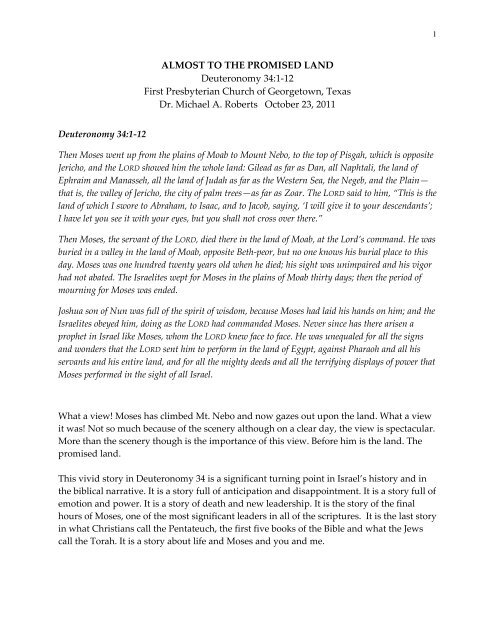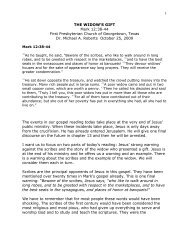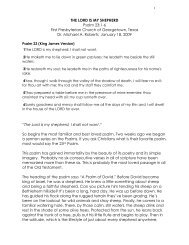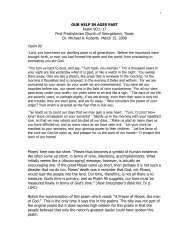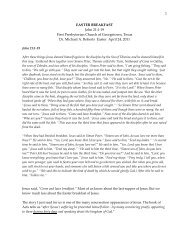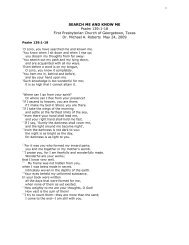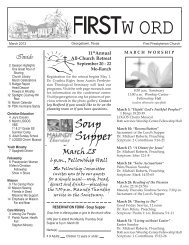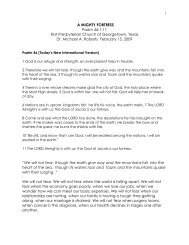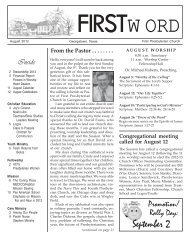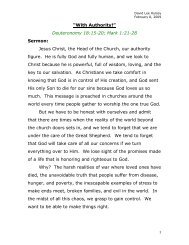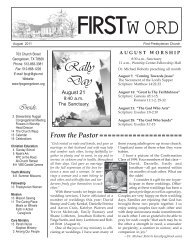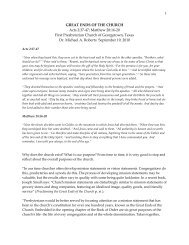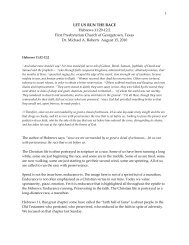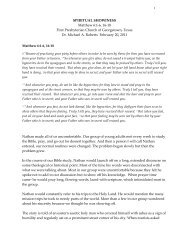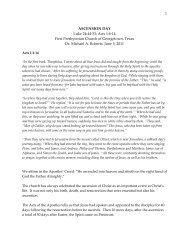ALMOST TO THE PROMISED LAND Deuteronomy 34:1-12 First ...
ALMOST TO THE PROMISED LAND Deuteronomy 34:1-12 First ...
ALMOST TO THE PROMISED LAND Deuteronomy 34:1-12 First ...
Create successful ePaper yourself
Turn your PDF publications into a flip-book with our unique Google optimized e-Paper software.
1<strong>ALMOST</strong> <strong>TO</strong> <strong>THE</strong> <strong>PROMISED</strong> <strong>LAND</strong><strong>Deuteronomy</strong> <strong>34</strong>:1-<strong>12</strong><strong>First</strong> Presbyterian Church of Georgetown, TexasDr. Michael A. Roberts October 23, 2011<strong>Deuteronomy</strong> <strong>34</strong>:1-<strong>12</strong>Then Moses went up from the plains of Moab to Mount Nebo, to the top of Pisgah, which is oppositeJericho, and the LORD showed him the whole land: Gilead as far as Dan, all Naphtali, the land ofEphraim and Manasseh, all the land of Judah as far as the Western Sea, the Negeb, and the Plain—that is, the valley of Jericho, the city of palm trees—as far as Zoar. The LORD said to him, “This is theland of which I swore to Abraham, to Isaac, and to Jacob, saying, ‘I will give it to your descendants’;I have let you see it with your eyes, but you shall not cross over there.”Then Moses, the servant of the LORD, died there in the land of Moab, at the Lord’s command. He wasburied in a valley in the land of Moab, opposite Beth-peor, but no one knows his burial place to thisday. Moses was one hundred twenty years old when he died; his sight was unimpaired and his vigorhad not abated. The Israelites wept for Moses in the plains of Moab thirty days; then the period ofmourning for Moses was ended.Joshua son of Nun was full of the spirit of wisdom, because Moses had laid his hands on him; and theIsraelites obeyed him, doing as the LORD had commanded Moses. Never since has there arisen aprophet in Israel like Moses, whom the LORD knew face to face. He was unequaled for all the signsand wonders that the LORD sent him to perform in the land of Egypt, against Pharaoh and all hisservants and his entire land, and for all the mighty deeds and all the terrifying displays of power thatMoses performed in the sight of all Israel.What a view! Moses has climbed Mt. Nebo and now gazes out upon the land. What a viewit was! Not so much because of the scenery although on a clear day, the view is spectacular.More than the scenery though is the importance of this view. Before him is the land. Thepromised land.This vivid story in <strong>Deuteronomy</strong> <strong>34</strong> is a significant turning point in Israel’s history and inthe biblical narrative. It is a story full of anticipation and disappointment. It is a story full ofemotion and power. It is a story of death and new leadership. It is the story of the finalhours of Moses, one of the most significant leaders in all of the scriptures. It is the last storyin what Christians call the Pentateuch, the first five books of the Bible and what the Jewscall the Torah. It is a story about life and Moses and you and me.
2You’ll remember the beginning of this story. The Hebrew people had settled in Egyptbecause of famine in Canaan. The Egyptians enslaved the Hebrew people and they criedout to God. God heard their cry and a Levite woman gave birth to Moses. He was placed ina basket for his safety and sent down the river to be discovered by a daughter of theEgyptian pharaoh. Therefore, Moses was raised in the Egyptian court. When he was 40, hesaw one of his fellow Hebrews being abused by an Egyptian taskmaster. Losing his cool,taking matters into his own hands, Moses killed the Egyptian. Forced to flee his homelandhe went to the wilderness of the Sinai peninsula.Forty years later, according to the story, he heard the call of God from a burning bush toreturn and lead his people out of Egypt. Through many dramatic confrontations with thePharaoh, he eventually led the people through the Red Sea and into the wilderness heknew so well. Moses struggled in leading the people. The ingratitude and sinfulness of thepeople came to the fore. The people were unfaithful and disobedient. The people spentsome forty years in the wilderness. While there Moses went up on Mt. Sinai, received thelaw, and talked with God.Here we are now, at the end of his long life. The journey, the long journey of his life isalmost over. Mt. Nebo is not a high mountain, only 2,600 feet above sea level but it mayhave taken Moses awhile to climb it. On the other hand, maybe he bounded up thatmountain. All his life, he heard of this land. Way, way back in time some 800 years earlierAbraham and Sarah heard God’s call and promise to go to the land. While growing up,Moses no doubt heard many whispers about the promised land. Moses was the one Godfinally used to galvanize the people to break free from Egypt. It was never easy, but now hehad led them to the brink of the land.Never before, though, had he seen the land. Until now. He reaches the peak, the windblowing around him, and gazes upon this land, this promised land. Oh my. The view tookhis breath away. The sheer exhilaration and the deep sadness intermingled in his heart andmind. The power of that moment.Then the word of the Lord comes to Moses in verse 4: “This is the land of which I swore toAbraham, to Issac, and to Jacob, saying, I will give it to your descendants”, I have let you see it withyour eyes, but you shall not cross over there.” Then Moses, the servant of the Lord died there in theland of Moab.”If this last chapter is the only one in <strong>Deuteronomy</strong> that we read, we are shocked to discoverthat Moses will not be allowed to enter the land. But if one reads the book throughout, onediscovers that this is a constant theme of <strong>Deuteronomy</strong>- why Moses was not allowed toenter the land of promise. “Moses’ death outside the land was inexplicable. If anybody
3went into the land, it should have been Moses. In his death there is an unfulfillment of thehighest order, in that a life is cut short of the goal toward which it has always beendirected” (Patrick Miller).Why is Moses not allowed to go in? We wish scripture were clearer here but at least tworeasons are given. The first reason is Moses’ unfaithfulness at Meribah described in Exodus17:1-7 and Numbers 20:2-13. That’s a cryptic episode where Moses brings water to thepeople but the precise character of Moses’ unfaithfulness is unclear. Some have guessed itwas Moses’ anger or temper, others think it was his presumption or impatience with God,still others guess that it was his arrogance.There is also a second reason given in <strong>Deuteronomy</strong> in addition to Moses’ ownunfaithfulness- the unfaithfulness of the people. In <strong>Deuteronomy</strong> 3:23-29 Moses tells thepeople of a conversation he had with God. Moses pleaded with God to allow him to go intothe land. The key verse of that chapter is verse 26 which says: “But the Lord was angry withme on your account and would not heed me. The Lord said to me, Enough from you! Never speak tome of this matter again!” Like Jesus who comes 1,200 years after him, Moses will suffer forthe sins of the people. Scripture is ambiguous but the reasons given for Moses not beingallowed to into the promised land are Moses’ own unfaithfulness and Israel’sunfaithfulness.We will come back to Moses in a moment but this story strikes me as being very rich andrelevant to our lives. Life always has an unfinished and imperfect quality about it. Canyou remember back to when you approached life idealistically? Maybe that was two yearsago, or forty years ago, or maybe you’re 80 years old and you still approach lifeidealistically.For most of us though, growing older makes us a bit more realistic. One of the primaryreasons we gain realism is because of the disappointments and unfulfilled dreams we allexperience in our lives.We have dreams for our relationships. We can envision healthy communication with ourspouses, joyous times with our friends, long-lasting caring relationships with our children.There are times when those dreams come true. But there also times when they do not.We’re almost to the promised land but not quite.We have dreams for our careers. We wanted work that was fulfilling, meaningful, lucrative,enjoyable. We envisioned a job that we loved going to on Monday morning. At one point inour life, we had the dream of a great job. There are times when those dreams come true.But there are also times when they do not. We’re almost to the promised land, but notquite.
4We have dreams for our spiritual lives. At one time we dreamed about being close to God,having an enlivening relationship with God. We dreamed of being part of a church thatwas vital, caring, dynamic, compassionate. There are times when our dreams come true.But there are also times when they do not. We’re almost to the promised land, but notquite.We have dreams about the church, about our children, about our parents, about the worldwe live in. Sometimes we achieve our dreams, sometimes we don’t.There are, of course, good things about dreaming. Those who dream see potential andwhen we see potential we can often move forward to make necessary changes. Those whodream have hope which is in such short supply nowadays. Those who dream can visualizea healthy relationship. They can see a vital relationship with God. They can look ahead andsee a healthy church. They can envision a time when races and nations will get along. Theworld is a better place because we dream and hope and look to the future.In fact, the Israelites are probably on the edge of the promised land because of Moses’vision, his dreams, his hopes inspired by God. If not for him, the Israelites might still bepartying around the golden calf. Dreaming about the possibilities is a great good.But this story in <strong>Deuteronomy</strong> has a deep truth that all of us who dream about anything inlife also need to hear- life always has an unfinished, imperfect quality to it. Life always hasdisappointments.In the final speech of his life, Martin Luther King Jr. made a haunting allusion to this storyin <strong>Deuteronomy</strong> <strong>34</strong>. He said: “I have been to the mountaintop. God’s allowed me to go upto the mountain, and I’ve looked over, and I’ve seen the promised land. I may not get therewith you. But I want you to know tonight that we, as a people will get to the promisedland. And so I am happy tonight…Mine eyes have seen the glory of the coming of theLord.” After that speech King returned to his motel room, was hit by an assassin’s bullet,and died that night (Quoted in Yancey’s The Bible Jesus Read p. 99). Life is full ofimperfections, incompletions, and disappointments.How we face those disappointments is critical for our lives. There are many ways we canface disappointment in life. We can be angry. We can be sad. We can work harder forchange. We can grow disillusioned. We can become bitter over time. We can becomecynical. We can also pray, reflect on God’s purposes, and grow in our acceptance of newrealities.
5This story in <strong>Deuteronomy</strong> <strong>34</strong> reminds us that life will never be perfect. Life will always beincomplete. Can we live with those imperfections? Can we handle the incomplete quality oflife? Some of us are more grounded than others and this is not a struggle. For others, wehave a tough time with this. We don’t handle earthly reality very well at all. We want thisworld to be heaven, even though it’s not. To realize that life always has an unfinished,imperfect quality to it is one of life’s more important lessons.Our story ends dramatically although quietly with Moses’ death right there on themountain. His death left quite a void for Israel. They mourned for 30 days. The author of<strong>Deuteronomy</strong> can’t end the Torah without a comment about what Moses has meant to thepeople: “Never since has there arisen a prophet in Israel like Moses, whom the Lord knew face toface. He was unequaled for all the signs and wonders that the Lord sent him to perform in the land ofEgypt, against Pharaoh and all his servants and his entire land, and for all the mighty deeds and allthe terrifying displays of power that Moses performed in the sight of all Israel.”This is perhaps the other lesson of our text this morning. Life is imperfect and incomplete.But there’s still a life to live. Moses still has accomplished much. Moses was not perfect.You’re not perfect and neither am I. But there’s still a life to live.Although imperfect, Moses still sought God’s presence, still wanted to know God.Although unfinished, Moses still was the giver and interpreter of God’s law to the people.Although incomplete, Moses still was the one to lead the people out of Egypt. Althoughdisappointed, Moses still lived his life day to day in God’s presence.Please recognize life’s incompleteness, imperfection, and disappointments. You will bemuch healthier if you do so. But do not let them hinder you from living. We all have peopleto love, tasks to do, missions to accomplish, children to care for, projects to see through tothe end. There is a time to live. No matter how long we live, life is short, it is not forever.There is only so much time to live a life, to labor, to relax, to travel, to enjoy your family.We must seize the day, celebrate the moments, enjoy the hours and days of our existence.For all of us, this is the time to live. We ask, what is God calling us to do, in our lives, withthe time and resources we have available? Even with life’s limitations, what is it that Godwants us to do and to say? Even in the midst of life’s losses, what is it that God wants us tofocus our attention on?We’re not to the promised land yet. We’re almost to the promised land. But, maybe, dayafter day, with God’s presence, we’re close enough.
6Prayers of the PeopleHoly God, we do not always understand your purposes in the world. Yet we know thatyour presence and mercy will accomplish your mission. Your presence is unexplainable butreal in our lives. We are grateful that you were present with Moses, with Jesus, with yourpeople through the centuries, and with us today.We acknowledge to you, O God of Comfort, that each of us has unfulfilled dreams. Give usthe strength to reach your potential for our lives. Enable us, if necessary, to accept theimperfections of this world. Comfort those who grieve and are saddened by losses and theincompleteness of life.We pray, Loving God:for those who had a shaky and troubling weekfor those who are trying to discern your will for their futurefor those who miss their spouse or their childfor those who teach and nurture the children in this churchfor those who are disappointed about life.We offer these prayers to you in the name of Jesus Christ. Amen.


